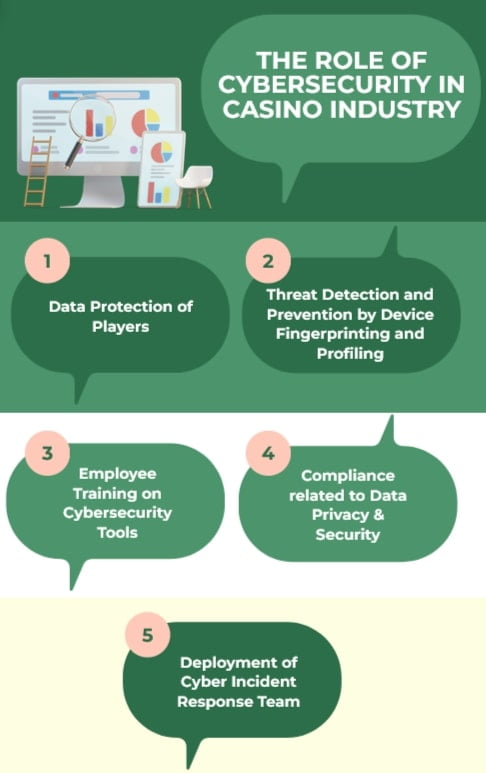The casino industry has come a long way from the days of brick-and-mortar establishments with simple slot machines and card tables. In today’s digital age, casinos have evolved into high-tech, interconnected hubs of entertainment.
As they’ve embraced technology to enhance the gaming experience, the importance of cybersecurity in the casino industry has grown exponentially.
This article explores the critical role of cybersecurity in safeguarding both the casinos themselves and the sensitive information of their patrons.
Table of Contents
The Digital Transformation of Casinos
The casino industry worldwide, including the best online casinos in Australia, has experienced a significant digital transformation in recent years.
From online gambling platforms to sophisticated slot machines and electronic table games, technology has become an integral part of the casino experience.
This shift has brought about numerous benefits, such as improved accessibility for players, enhanced game variety, and more personalized experiences. However, it has also opened up new avenues for cyber threats.
Cyber Threats in the Casino Industry
Cyber threats in the casino industry are diverse and ever-evolving. These threats can take various forms, including:
1. Data Breaches
One of the most significant concerns for casinos is the potential for data breaches. Casinos collect vast amounts of personal and financial information from their patrons, including names, addresses, and credit card details.
A data breach can result in the exposure of this sensitive information, leading to identity theft, financial losses, and reputational damage.
2. Insider Threats
Insider threats can come from employees or contractors with access to the casino’s systems and data. These individuals may intentionally or unintentionally compromise security, making it essential for casinos to have robust access controls and monitoring mechanisms in place.
3. Ransomware Attacks
Ransomware attacks have become increasingly common in recent years. Casinos are lucrative targets because they cannot afford downtime. A successful ransomware attack can disrupt operations and result in substantial financial losses.
4. Fraudulent Activities
Online casinos are susceptible to fraudulent activities, such as credit card fraud and money laundering. Cybersecurity measures are necessary to detect and prevent these illegal activities.
The Consequences of Cybersecurity Failures
The consequences of cybersecurity failures in the casino industry can be severe and far-reaching. Here are some of the potential outcomes:
1. Financial Losses
Data breaches and ransomware attacks can lead to significant financial losses, including the cost of remediation, legal fees, and potential fines.
2. Reputational Damage
A cybersecurity incident can damage a casino’s reputation, eroding trust among patrons. It may take years to rebuild that trust.
3. Legal Consequences
Casinos that fail to adequately protect customer data may face legal consequences and regulatory penalties. Compliance with data protection laws, such as the General Data Protection Regulation (GDPR) and the California Consumer Privacy Act (CCPA), is essential.
4. Operational Disruption
Ransomware attacks and other cyber incidents can disrupt casino operations, causing downtime and affecting the customer experience.
The Crucial Role of Cybersecurity in Casinos
Given the potential risks and consequences of cyber threats, cybersecurity has become an indispensable component of the casino industry. Here are some key ways in which cybersecurity plays a crucial role:

- Data Protection of Players: Cybersecurity measures, such as encryption and access controls, help protect sensitive player’s data from unauthorized access and breaches.
- Threat Detection and Prevention: Advanced security tools and monitoring systems are essential for detecting and preventing cyber threats in real time.
- Employee Training on Cybersecurity Tools: Employee training programs educate staff about cybersecurity best practices and help them recognize and respond to potential threats.
- Compliance Related to Data Privacy & Security: Casinos must comply with various data protection regulations, and cybersecurity measures are instrumental in meeting these legal requirements.
- Deployment of Cyber Incident Response Team: Having a well-defined incident response plan in place is critical for minimizing the impact of cyber incidents and facilitating a swift recovery.
The Need for Proactive Cybersecurity Strategies
The transformation of the casino industry into a digital playground has inevitably led to the need for more advanced and proactive cybersecurity strategies.
The integration of advanced technology, while enhancing the user experience, has heightened the exposure of casinos to the wider landscape of the internet, making them vulnerable to an array of potential cyberattacks.
To secure their platforms, casinos must go beyond just the baseline measures:
- Continuous Vulnerability Assessment: Just as cyber threats evolve, so too must cybersecurity strategies. Continuous vulnerability assessments allow casinos to identify and patch potential weak points before they can be exploited.
- This involves regular scanning and testing of systems to ensure that all software is up-to-date and that potential vulnerabilities are addressed promptly.
- Multi-Factor Authentication (MFA): One way to enhance security is by employing MFA. By requiring users to provide two or more verification factors, the chances of unauthorized access are drastically reduced.
- Even if a hacker gets hold of a user’s password, without the second form of authentication, access remains restricted.
- Dedicated Cybersecurity Teams: It’s no longer sufficient to rely on generic IT teams. Casinos need specialized cybersecurity teams whose sole focus is safeguarding digital assets.
- These teams monitor for threats round-the-clock, staying abreast of the latest cyber threats and mitigation strategies.
- Collaboration with Other Industries: Casinos don’t have to tackle cyber threats in isolation. There’s a lot they can learn from other sectors that have been grappling with cybersecurity challenges for longer.
- By collaborating and sharing insights, strategies can be refined and strengthened.
- Educating the End-Users: While technical measures are vital, the human element cannot be ignored. Often, breaches occur due to user negligence or oversight.
- By educating players about the importance of strong passwords, the risks of using unsecured networks, and how to spot phishing attempts, casinos can add another layer of defense.
In essence, while technology has thrust the casino industry into a new era, it has also presented complex challenges. Cybersecurity, in this regard, is not just about defense but also about ensuring business continuity and preserving customer trust.
Conclusion
In an increasingly digital and interconnected world, the casino industry’s reliance on technology makes it a prime target for cybercriminals. The consequences of cybersecurity failures can be devastating, affecting not only the financial health of casinos but also the trust of their patrons.



